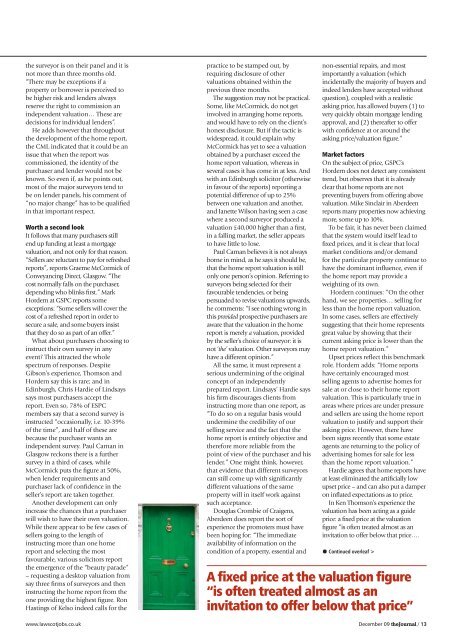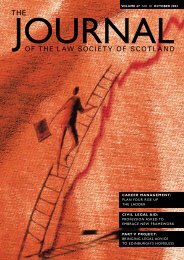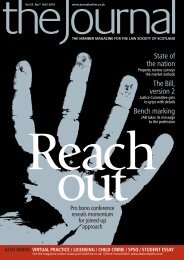Professional briefing - The Journal Online
Professional briefing - The Journal Online
Professional briefing - The Journal Online
Create successful ePaper yourself
Turn your PDF publications into a flip-book with our unique Google optimized e-Paper software.
the surveyor is on their panel and it is<br />
not more than three months old.<br />
“<strong>The</strong>re may be exceptions if a<br />
property or borrower is perceived to<br />
be higher risk and lenders always<br />
reserve the right to commission an<br />
independent valuation… <strong>The</strong>se are<br />
decisions for individual lenders”.<br />
He adds however that throughout<br />
the development of the home report,<br />
the CML indicated that it could be an<br />
issue that when the report was<br />
commissioned, the identity of the<br />
purchaser and lender would not be<br />
known. So even if, as he points out,<br />
most of the major surveyors tend to<br />
be on lender panels, his comment of<br />
“no major change” has to be qualified<br />
in that important respect.<br />
Worth a second look<br />
It follows that many purchasers still<br />
end up funding at least a mortgage<br />
valuation, and not only for that reason.<br />
“Sellers are reluctant to pay for refreshed<br />
reports”, reports Graeme McCormick of<br />
Conveyancing Direct, Glasgow. “<strong>The</strong><br />
cost normally falls on the purchaser,<br />
depending who blinks first.” Mark<br />
Hordern at GSPC reports some<br />
exceptions: “Some sellers will cover the<br />
cost of a refreshed report in order to<br />
secure a sale, and some buyers insist<br />
that they do so as part of an offer.”<br />
What about purchasers choosing to<br />
instruct their own survey in any<br />
event? This attracted the whole<br />
spectrum of responses. Despite<br />
Gibson’s experience, Thomson and<br />
Hordern say this is rare; and in<br />
Edinburgh, Chris Hardie of Lindsays<br />
says most purchasers accept the<br />
report. Even so, 78% of ESPC<br />
members say that a second survey is<br />
instructed “occasionally, i.e. 10-39%<br />
of the time”, and half of these are<br />
because the purchaser wants an<br />
independent survey. Paul Carnan in<br />
Glasgow reckons there is a further<br />
survey in a third of cases, while<br />
McCormick puts the figure at 50%,<br />
when lender requirements and<br />
purchaser lack of confidence in the<br />
seller’s report are taken together.<br />
Another development can only<br />
increase the chances that a purchaser<br />
will wish to have their own valuation.<br />
While there appear to be few cases of<br />
sellers going to the length of<br />
instructing more than one home<br />
report and selecting the most<br />
favourable, various solicitors report<br />
the emergence of the “beauty parade”<br />
– requesting a desktop valuation from<br />
say three firms of surveyors and then<br />
instructing the home report from the<br />
one providing the highest figure. Ron<br />
Hastings of Kelso indeed calls for the<br />
www.lawscotjobs.co.uk<br />
practice to be stamped out, by<br />
requiring disclosure of other<br />
valuations obtained within the<br />
previous three months.<br />
<strong>The</strong> suggestion may not be practical.<br />
Some, like McCormick, do not get<br />
involved in arranging home reports,<br />
and would have to rely on the client’s<br />
honest disclosure. But if the tactic is<br />
widespread, it could explain why<br />
McCormick has yet to see a valuation<br />
obtained by a purchaser exceed the<br />
home report valuation, whereas in<br />
several cases it has come in at less. And<br />
with an Edinburgh solicitor (otherwise<br />
in favour of the reports) reporting a<br />
potential difference of up to 25%<br />
between one valuation and another,<br />
and Janette Wilson having seen a case<br />
where a second surveyor produced a<br />
valuation £40,000 higher than a first,<br />
in a falling market, the seller appears<br />
to have little to lose.<br />
Paul Carnan believes it is not always<br />
borne in mind, as he says it should be,<br />
that the home report valuation is still<br />
only one person’s opinion. Referring to<br />
surveyors being selected for their<br />
favourable tendencies, or being<br />
persuaded to revise valuations upwards,<br />
he comments: “I see nothing wrong in<br />
this provided prospective purchasers are<br />
aware that the valuation in the home<br />
report is merely a valuation, provided<br />
by the seller’s choice of surveyor: it is<br />
not ‘the’ valuation. Other surveyors may<br />
have a different opinion.”<br />
All the same, it must represent a<br />
serious undermining of the original<br />
concept of an independently<br />
prepared report. Lindsays’ Hardie says<br />
his firm discourages clients from<br />
instructing more than one report, as<br />
“To do so on a regular basis would<br />
undermine the credibility of our<br />
selling service and the fact that the<br />
home report is entirely objective and<br />
therefore more reliable from the<br />
point of view of the purchaser and his<br />
lender.” One might think, however,<br />
that evidence that different surveyors<br />
can still come up with significantly<br />
different valuations of the same<br />
property will in itself work against<br />
such acceptance.<br />
Douglas Crombie of Craigens,<br />
Aberdeen does report the sort of<br />
experience the promoters must have<br />
been hoping for: “<strong>The</strong> immediate<br />
availability of information on the<br />
condition of a property, essential and<br />
non-essential repairs, and most<br />
importantly a valuation (which<br />
incidentally the majority of buyers and<br />
indeed lenders have accepted without<br />
question), coupled with a realistic<br />
asking price, has allowed buyers (1) to<br />
very quickly obtain mortgage lending<br />
approval, and (2) thereafter to offer<br />
with confidence at or around the<br />
asking price/valuation figure.”<br />
Market factors<br />
On the subject of price, GSPC’s<br />
Hordern does not detect any consistent<br />
trend, but observes that it is already<br />
clear that home reports are not<br />
preventing buyers from offering above<br />
valuation. Mike Sinclair in Aberdeen<br />
reports many properties now achieving<br />
more, some up to 10%.<br />
To be fair, it has never been claimed<br />
that the system would itself lead to<br />
fixed prices, and it is clear that local<br />
market conditions and/or demand<br />
for the particular property continue to<br />
have the dominant influence, even if<br />
the home report may provide a<br />
weighting of its own.<br />
Hordern continues: “On the other<br />
hand, we see properties… selling for<br />
less than the home report valuation.<br />
In some cases, sellers are effectively<br />
suggesting that their home represents<br />
great value by showing that their<br />
current asking price is lower than the<br />
home report valuation.”<br />
Upset prices reflect this benchmark<br />
role. Hordern adds: “Home reports<br />
have certainly encouraged most<br />
selling agents to advertise homes for<br />
sale at or close to their home report<br />
valuation. This is particularly true in<br />
areas where prices are under pressure<br />
and sellers are using the home report<br />
valuation to justify and support their<br />
asking price. However, there have<br />
been signs recently that some estate<br />
agents are returning to the policy of<br />
advertising homes for sale for less<br />
than the home report valuation.”<br />
Hardie agrees that home reports have<br />
at least eliminated the artificially low<br />
upset price – and can also put a damper<br />
on inflated expectations as to price.<br />
In Ken Thomson’s experience the<br />
valuation has been acting as a guide<br />
price: a fixed price at the valuation<br />
figure “is often treated almost as an<br />
invitation to offer below that price….<br />
Continued overleaf ><br />
A fixed price at the valuation figure<br />
“is often treated almost as an<br />
invitation to offer below that price”<br />
December 09 the<strong>Journal</strong> / 13










